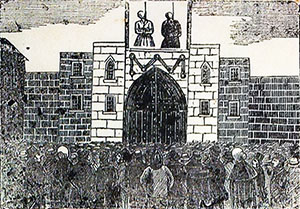Charles Dickens Witnesses a Hanging
Marie and Frederick Manning Executed for Murder
Horsemonger Lane Gaol - November 13, 1849
 Dickens attended the execution of Mr And Mrs Manning on November 13, 1849 at the Horsemonger Lane Gaol in Southwark. The Mannings had murdered a friend for his money and had buried him under the kitchen floor. The case was billed as the "Bermondsey Horror" and this was the first husband and wife execution in 150 years (Wikipedia). Dickens joined a crowd of 30,000, watching the proceedings from a rooftop overlooking the prison. The next day Dickens wrote a scathing letter to The Times condemning the circus atmosphere of the crowd and advocating an end to public executions (Slater, 2009, p. 298-299).
Dickens attended the execution of Mr And Mrs Manning on November 13, 1849 at the Horsemonger Lane Gaol in Southwark. The Mannings had murdered a friend for his money and had buried him under the kitchen floor. The case was billed as the "Bermondsey Horror" and this was the first husband and wife execution in 150 years (Wikipedia). Dickens joined a crowd of 30,000, watching the proceedings from a rooftop overlooking the prison. The next day Dickens wrote a scathing letter to The Times condemning the circus atmosphere of the crowd and advocating an end to public executions (Slater, 2009, p. 298-299).
Information on the Manning crime, trial, and execution
Dickens' letter to The Times Nov. 13, 1849

The Mannings execution at Horsemonger Lane Gaol
I was a witness of the execution at Horsemonger Lane this morning. I went there with the intention of observing the crowd gathered to behold it, and I had excellent opportunities of doing so, at intervals all through the night, and continuously from day-break until after the spectacle was over... I believe that a sight so inconceivably awful as the wickedness and levity of the immense crowd collected at that execution this morning could be imagined by no man, and could be presented in no heathen land under the sun. The horrors of the gibbet and of the crime which brought the wretched murderers to it faded in my mind before the atrocious bearing, looks, and language of the assembled spectators. When I came upon the scene at midnight, the shrillness of the cries and howls that were raised from time to time, denoting that they came from a concourse of boys and girls already assembled in the best places, made my blood run cold. As the night went on, screeching, and laughing, and yelling in strong chorus of parodies on negro melodies, with substitutions of 'Mrs Manning' for 'Susannah', and the like, were added to these. When the day dawned, thieves, low prostitutes, ruffians, and vagabonds of every kind, flocked on to the ground, with every variety of offensive and foul behaviour. Fightings, faintings, whistlings, imitations of Punch, brutal jokes, tumultuous demonstrations of indecent delight when swooning women were dragged out of the crowd by the police, with their dresses disordered, gave a new zest to the general entertainment. When the sun rose brightly-as it did-it gilded thousands upon thousands of upturned faces, so inexpressibly odious in their brutal mirth or callousness, that a man had cause to feel ashamed of the shape he wore, and to shrink from himself, as fashioned in the image of the Devil. When the two miserable creatures who attracted all this ghastly sight about them were turned quivering into the air, there was no more emotion, no more pity, no more thought that two immortal souls had gone to judgement, no more restraint in any of the previous obscenities, than if the name of Christ had never been heard in this world, and there were no belief among men but that they perished like the beasts (Hartley, 2012, p. 205-206).
Charles Dickens to the Editor of The Times, Letters. Nov. 13, 1849
